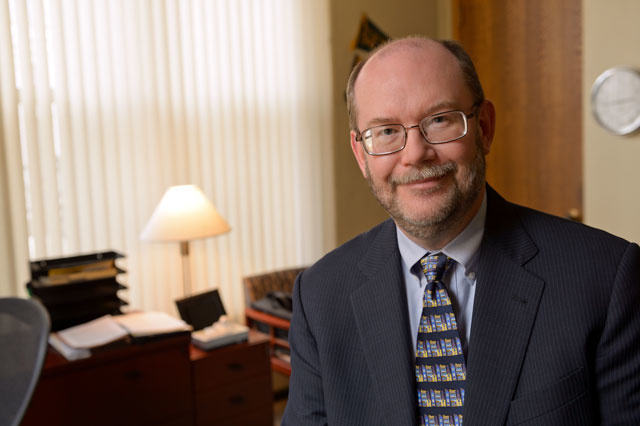The University of Iowa’s vice president for research and economic development will discuss high-performance computing and its potential impact on health and society in a forum in Washington DC.

Daniel Reed will appear at the American Chemical Society’s (ACS) “Science & the Congress Project,” a series of briefings on scientific issues targeted to congressional representatives and their staffs. The forum will run from noon to 1:30 p.m. on June 4 in Room 106 of the Dirksen Senate Office Building. The event is titled, “21st Century Infrastructure: Computing and Big Data Applications.” It is open to the public, and the ACS expects to post a webcast in late June.
Two weeks ago, Reed testified before a House subcommittee on exascale computing, the next generation of supercomputers designed to tackle complex societal questions, from climate change to the human mind. He noted for the panel that while the U.S. remains the leader in high-performance computing, the nation’s superiority is eroding, and will be jeopardized if partnerships among governmental agencies, with industry as well as adequate funding are not pursued.
He will strike a similar theme at the ACS gathering, emphasizing the potential enormous societal yields from using advanced computing to sift through large volumes of data, balanced by the challenges of Big Data, including hardware, privacy and security concerns and legal issues.
“The explosive growth of digital data (big data) is transforming how we conduct research, deliver products and services and build electronic communities,” Reed says.
Reed has been actively involved in advanced computing for nearly 30 years, leading the National Science Foundation’s National Center for Supercomputing Applications at the University of Illinois, the Renaissance Computing Institute in the Research Triangle in North Carolina as well as being the chief architect for the NSF TeraGrid. Before coming to Iowa last fall, Reed was an executive at Microsoft Corp., helping shape the company’s vision for technology innovations in parallel and cloud computing and its engagement with governments and institutions worldwide.
He will be joined by Dennis Goo, who works on high-performance computing issues for Intel, Corp.; Jeffrey Nichols, associate laboratory director at the Oak Ridge National Laboratory; and Stephanie Shipp, senior research staff member at the Science and Technology Policy Institute. The moderator will be Anthony Boccanfuso, executive director of the University Industry Demonstration Partnership.

The ACS has been holding Science & the Congress Project briefings since 1995.